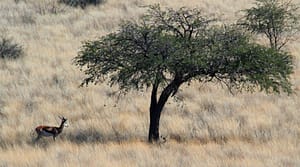The Kalahari has existed as an inland desert since the Cretaceous period (65-135 million years ago). It has experienced both periods of greater humidity and more aridity, documented in fossil dune fields. It was during a period of greater rainfall that the Makgadikgadi Depression in northern Botswana was formed. The dry riverbeds that now only hold water when it rains are also from such periods. The first European to cross the Kalahari was David Livingstone accompanied by William C. Oswell, in 1849. The Kalahari is the ancestral land of the Bushmen or San peoples. The first Europeans who entered the Kalahari after Livingstone came as travellers, missionaries, ivory hunters, and traders. The only European settlement was in the Ghanzi District, where a number of families were allowed ranching blocks in the 1890s. Until the 1960s they led a life of isolation and poverty, but since then they have been able to gain ownership of the land and improve their living conditions.
There are many distinct tribes, and they have no collective name for themselves. The names San and
Basarwa are sometimes used, but the people themselves dislike these names (San is a Khoikhoi word meaning outsider, and Basarwa a Herero word meaning person who has nothing) and prefer the name “Bushman.” Their language, Khoisan, is a language of clicks. The name Bushmen was given to
them by early settlers who may have named them for the fact they live in the bush or it might have been given because of their use of aromatic spices collected from various bushes. They are thought to have been the first human inhabitants of Southern Africa; there is evidence that they have been living there continuously as nomadic hunter gatherers for over twenty thousand years. The Bushmen were first brought to the Western world’s attention in the 1950s when South African author Laurens van
Every one of the many ethnic cultures in Botswana has its own heritage of myths, legends, rituals, values and traditional artistic norms. However, the overlapping similarities between the different components create a homogenous culture, giving a rich and colourful patchwork of the diverse whole. Marriage rites and ceremonies differ considerably between the tribes, but all are accepted in the many intermarriages taking place. Setswana, originally the tongue of the Tswana group, is the official language of Botswana, with English the main business language. Batswana are proud, strong people, with a sense of unity linking them all to the democratic and peaceful development of their country. The dominant religion is Christianity, with a number of sects represented.

